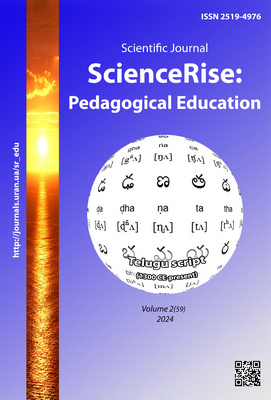Insights into teachers' training and professional development: introducing online technologies
DOI:
https://doi.org/10.15587/2519-4984.2024.303790Keywords:
CLIL methodology, e-course, Moodle platform, online technologies, teacher trainingAbstract
The article deals with the problem of professional development of teachers and lecturers in Ukraine in today's challenging conditions. The authors of the article are representatives of the development team of the online course "Content and Language Integrated Learning (CLIL) Methodology" for educators. It is a product of the collective creativity of the Foreign Language Teacher Training Capacity Development as a Way to Ukraine’s Multilingual Education and European Integration (MultiEd) project team, co-working under the umbrella of the Erasmus+KA2 programme. The course is hosted on the Moodle platform of Zaporizhzhia National University; it is aimed at training specialists capable of adapting and implementing advanced teaching methods in the educational process of the New Ukrainian School. This course is designed for subject teachers, foreign language teachers in secondary and higher education, as well as educational institution leaders who understand the contemporary challenges of education in line with the demands of the job market and are interested in modernizing existing educational programs, improving teaching and learning methods, and implementing a culture of quality assurance in education. The course is developed in the Ukrainian and English languages; it is flexible in time and choosing subject themes to fill the gaps in knowledge. The article presents the stages of course development and implementation, description of its content and structural elements. The course was piloted in all UA universities, partnered with the MultiEd team, encompassing 583 participants, 466 of which successfully completed the course. This article focuses on the results of 194 participants’ training on the Moodle platform of Zaporizhzhia National University (March – November 2023), their progress, evaluation and critical remarks, and highlights the prospects of its use in the system of professional teacher training
Supporting Agency
- Erasmus Programme of the European Union
References
- The world’s largest ranking of countries and regions by English skills (2023). English Proficiency Index. Available at: https://www.ef.com/wwen/epi/
- Deiaki pytannia pidvyshchennia kvalifikatsii pedahohichnykh i naukovo-pedahohichnykh pratsivnykiv (2019). Postanova KMU Ukrainy No. 800. 21.08.2019. Available at: https://zakon.rada.gov.ua/laws/show/800-2019-%D0%BF#Text
- Fialho, P., Quintini, G., Vandeweyer, M. (2019). Returns to different forms of job related training: Factoring in informal learning. OECD Social, Employment and Migration Working Papers, 231. https://doi.org/10.1787/b21807e9-en
- Arfaoui, F., Kammoun, I. (2023). Did accounting education remain resistant to digitalization during COVID-19? An exploratory study in the Tunisian context. Journal of Accounting Education, 65. https://doi.org/10.1016/j.jaccedu.2023.100874
- Zubko, A. M., Zhorova, I. Y., Kuzmenko, V. V., Slyusarenko, N. V., Kokhanovska, О. V. (2020). Information and communication technologies as a factor of teachers’ professional development in the system of postgraduate education. Information Technologies and Learning Tools, 77 (3), 262–281. https://doi.org/10.33407/itlt.v77i3.3562
- Pozdnyakova, O., Pozdnyakov, A. (2017). Adult Students’ Problems in the Distance Learning. Procedia Engineering, 178, 243–248. https://doi.org/10.1016/j.proeng.2017.01.105
- The potential of online learning for adults: Early lessons from the COVID-19 crisis (2020). OECD Policy Responses to Coronavirus (COVID-19). Available at: https://www.oecd.org/coronavirus/policy-responses/the-potential-of-online-learning-for-adults-early-lessons-from-the-covid-19-crisis-ee040002/
- Nychkalo, N. H., Chernovol-Tkachenko, R. I., Prokopenko, I. F. et al.; Nychkalo, N. H., Prokopenka, I. F. (Ed.) (2020). Osvita doroslykh: svitovi tendentsii, ukrainski realii ta perspektyvy. Kharkiv: Brovin O. V., 544.
- Marsh, D., Mehisto, P., Wolff, D., Frigols, M. J. (2011). The European Framework for CLIL Teacher Education. Graz: European Centre for Modern Languages. Available at: https://www.ecml.at/Portals/1/documents/ECML-resources/CLIL-EN.pdf?ver=2018-03-21-153925-563
- Dalton-Puffer, C., Hüttner, J., Llinares, A. (2022). CLIL in the 21st Century. Journal of Immersion and Content-Based Language Education, 10 (2), 182–206. Portico. https://doi.org/10.1075/jicb.21021.dal
- Maldonado Chauca, A. K., Pérez Ortiz, C. S., Campoverde Lopez, J. S. (2023). Implementation of Content and Language Integrated Learning Methodological Guide to Improve Learning of Science in English. Ciencia Latina Revista Científica Multidisciplinar, 7 (5), 6837–6860. https://doi.org/10.37811/cl_rcm.v7i5.8268
Downloads
Published
How to Cite
Issue
Section
License
Copyright (c) 2024 Svitlana Zapolskykh, Natalia Nadtochii

This work is licensed under a Creative Commons Attribution 4.0 International License.
Our journal abides by the Creative Commons CC BY copyright rights and permissions for open access journals.
Authors, who are published in this journal, agree to the following conditions:
1. The authors reserve the right to authorship of the work and pass the first publication right of this work to the journal under the terms of a Creative Commons CC BY, which allows others to freely distribute the published research with the obligatory reference to the authors of the original work and the first publication of the work in this journal.
2. The authors have the right to conclude separate supplement agreements that relate to non-exclusive work distribution in the form in which it has been published by the journal (for example, to upload the work to the online storage of the journal or publish it as part of a monograph), provided that the reference to the first publication of the work in this journal is included.








